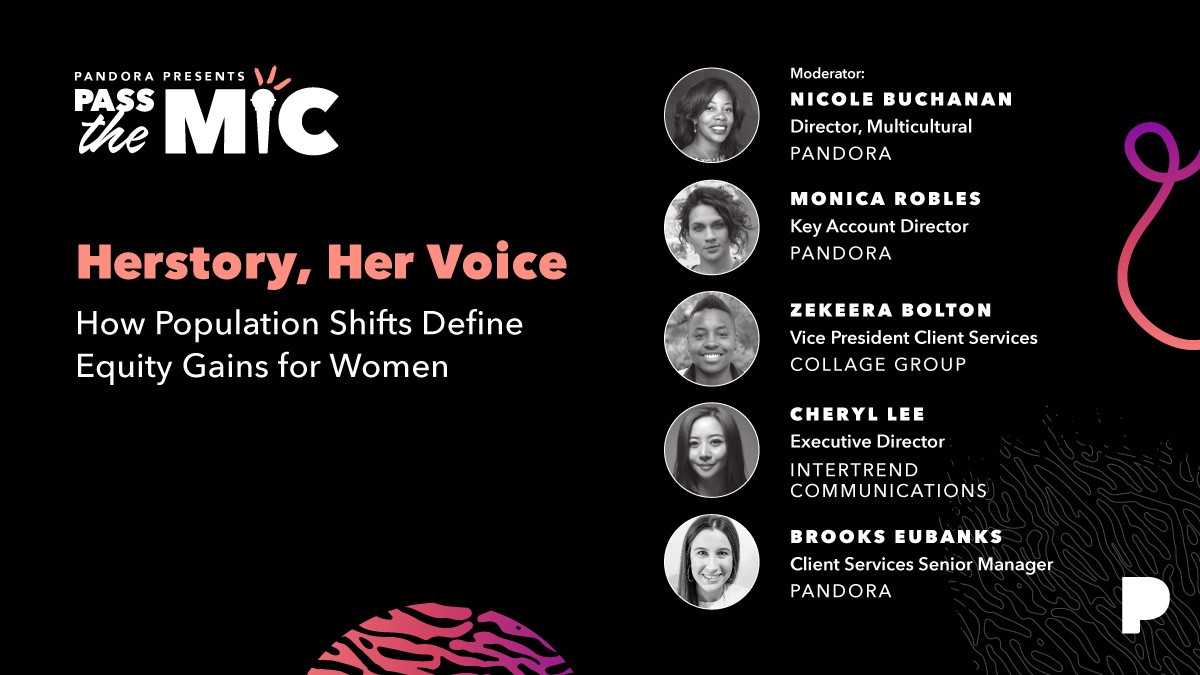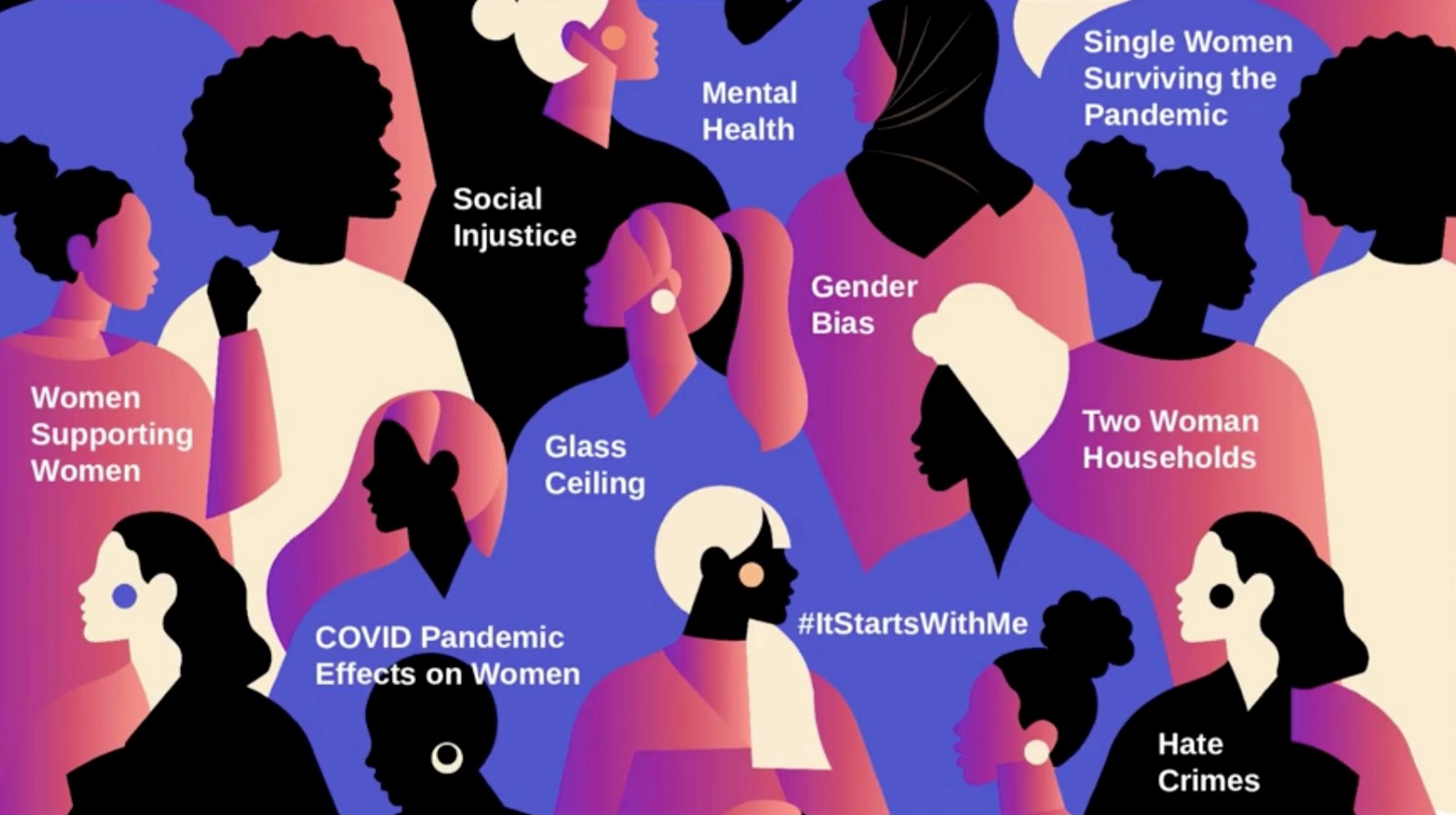Herstory, Her Voice

In March, for Women's History Month, Intertrend participated in a virtual panel moderated by Nichole Buchanan, Director of Multicultural at Pandora, that was part of the Pandora Presents Pass the Mic series, supported as well by SiriusXM and Stitcher.
The Herstory, Her Voice panel consisted of:
Monica Robles, Key Account Director, Pandora
Zekeera Belton, Vice President of Client Services, Collage Group
Cheryl Lee, Executive Director, Intertrend
Brooks Eubanks, Senior Manager, Pandora
Nicole quoted Elaine Welteroth in her opening remarks, "There is so much wisdom locked up in the stories women never tell." Nicole then went on to say, "Today we've invited a few super dynamic women to share their perspectives and wisdom on a few topics that are really pressing and of interest to women today." The panel covered the subjects of recovery and balance, the incredible impact of 2020, a volatile political landscape, and demographic shifts.
Pandemic Effects on Women in the Workforce
The pandemic has hit women particularly hard. According to the McKinsey & Company Women in the Workplace 2020 report, as many as two million women are considering leaving the workforce. Women of color are even more disproportionately negatively affected by the events of 2020 - the pandemic as well as political shits and a rise in racist incidents.
In thinking about the overall impact of 2020, Zekeera Belton observed how Black women have been suffering from the coronavirus and suffering financially. She said, "Things like our poorer health are driven by systemic racism, lack of access to care, and overall distrust in the health system, so you hear these motifs playing out in conversations about the vaccine. On top of this, many of the jobs that Black women work include roles on the frontlines… and many of these positions are lower paid and do not offer things like paid sick leave… So the pandemic has just compounded these forces that drive negative health outcomes and financial instability of Black people and Black women, specifically." From a personal perspective, she observed how she felt like she needed to give more personally and professionally to the people relying on her and that it was exhausting.
Cheryl Lee continued on the subject of social isolation, "I'm first generation Asian American from Taiwan so I haven't seen my parents who live in Taiwan for two years because of the pandemic so this sense of isolation definitely impacted me personally. And today, talking about the Covid-19 recession, it has really hit communities unevenly, especially women… Women continue to struggle balancing work demands and an ever-growing obligation at home." She cited a U.S. Bureau of Labor Statistics report that stated 44% of unemployed Asian American women have been out of work for six months or more, faring worse than all U.S. women on average at 38.6%. Cheryl said that employers must seriously consider how they can help women get back on their feet and not only reenter the workforce but regain valuable career advancement opportunities.
Somberly, Brooks Eubanks and Monica Robles both spoke on how the studies that have observed the negative effects of the pandemic on women are only capturing the tip of the iceberg. They said they believe that the gap between women and men in terms of pay, leadership positions, and opportunities will widen further because of this last year of unique challenges and loss.

Brands Acting Authentically
Brands and companies are actively responding to societal changes, paying closer attention to what people care about when it comes to race, ethnicity, and gender. How are brands connecting authentically to women?
Brooks said, "Brands are realizing we crave authenticity from a female perspective as well as from a racial perspective. Less perfect looking because life is not perfect right now. So acknowledging and meeting women where they are, I feel myself gravitating towards those type of brands."
Monica continued, "Where do I know that I'm making the most impact through brand choices for things I have to buy or need? Shopping locally, going into businesses that are owned by women and minorities, that's where I know I can make a bigger impact, as opposed to supporting brands that put some kind of flag or ribbon on something, understanding that's just a marketing strategy that no longer works." She observed that consumers are much more savvy now and investigate company employment practices and how they put their money where their mouth is.
"There needs to be a cadence. We're all awake. We've been woke. We're paying attention," Nicole summarized the group's discussion, "You can't just hit me with a hello, a drive-by, you have to actually have a conversation with me. And I'm paying attention if you're going to step in this space with me and have this conversation."
Being more specific, with regards to the shooting in Atlanta and how brands are supporting Asian American women, Cheryl pointed out how Stop AAPI Hate recorded 3,795 hate incidents between March 19, 2020 to February 28, 2021 and how women reported hate incidents 2.3 times more than men. "When we look at the Atlanta shooting it's definitely a combination of racism and also the history of hyper-sexualization and fetishization of Asian women in the U.S. On top of that, the model minority myth really paints Asian Americans in an invisible way. We are an invisible minority, almost a forgotten group… If we're asking about whether brands have been responding, we've seen some good starts, but much work needs to be done." Cheryl commented on the statements brands have been making that express solidarity with the Asian American community and is personally hopeful that more action will come.
Measures of Success in Gender Equity
The panel spoke honestly about the gains and losses they've seen in gender equality and equity. Cheryl said that she would see success when there are more females in leadership roles. Zakeera responded to that thought by saying that while that seemed like an attainable goal, parity feels out of reach when women of color are underrepresented at every level and fundamental changes needed to be made at every phase of the pipeline. She highlighted the importance of corporate flexibility and organizational policies that should be changed to benefit women.
Monica said, "Let's talk equity. We talk so much about equality and that feels like we're bridging that gap because we walk into a room and there are a lot more women and there are more people of color, but are they getting the same resources to get to the point of promotion, of a leadership role? It takes a lot of advocacy to be able to do that and we can get to equality, but where are the other resources that will get us to where we need to be. Have we made a ton of progress? I think so. I think there's a lot more that we can be doing."
Listen to the Herstory, Her Voice panel in full here.